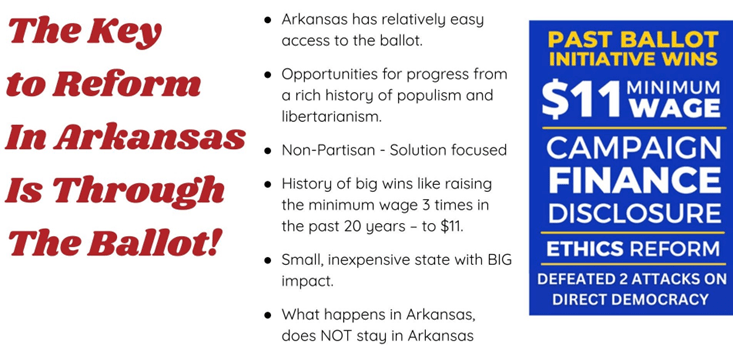Vina Kay, Director, Piper Fund and Piper Action Fund, initiatives of Proteus Fund and Proteus Action League
Bill Kopsky, Executive Director, Arkansas Public Policy Panel
Access to abortion care in Ohio. The chance to support city candidates with democracy vouchers in Seattle. Promoting judicial ethics in Colorado. An $11 an hour minimum wage in Arkansas. What do these policy changes have in common? They were all enacted through the ballot initiative process, and they all support healthy, thriving communities, both in process and in outcome.
Piper Fund, an initiative of Proteus Fund, supports community organizations in states working to educate the community about issues connected to judicial integrity, protecting the right to protest, and money in politics reform. Its sister 501c4 organization Piper Action Fund supports groups in encouraging participation in direct democracy efforts. Ballot initiatives are proven to be a powerful tool for advancing community-led policy change, and in the process, engaging voters in seeing their own power at the ballot box.
But multiple states are seeing efforts to curtail the ballot measure process, limiting the voices of voters. In 2023, Ohioans were faced with Issue 1 that proposed increasing the threshold for ballot measures to pass to 60 percent of the vote rather than a simple majority, just a few months before a question to enshrine abortion access in the state constitution would appear on the ballot in November. Voters protected both the ballot initiative process and abortion access.
A new law in Florida HB1205 is making it more difficult for community-led measures to get on the ballot, with restrictions that make it harder to gather signatures, require sharing personal information to sign a petition, shorten the time to submit signatures, create restrictive fines for organizations collecting signatures, and open the door to criminal investigations for errors on petitions. Groups in Florida, including Florida Right to Clean Water, Florida Decides Healthcare, and Smart and Safe Florida, have challenged the new law in court. They argue that the law creates barriers to organizing and constitutionally protected political speech, and is really intended to restrict citizen-led reforms from moving forward. In July, a federal judge blocked parts of the law that would have prevented non-Florida residents and non-U.S. citizens from collecting signatures from taking effect because of its “severe burden on political expression that the state has failed to justify.” But other provisions that make it harder to collect signatures remain in effect.
Like the groups in Florida, Piper Fund Judicial Integrity and Money in Politics Reform grantee Arkansas Public Policy Panel is working to advance solutions that matter in their communities, including an educational rights amendment and campaign finance and ethics reforms. But as part of those efforts, they and their partners need to protect the ability of Arkansans to participate in the ballot measure process itself. In the 2025 Arkansas legislative session, more than 20 bills were filed and 13 bills were passed that limit the right to propose, sign, and circulate ballot initiatives. The state legislature has imposed restrictions on the ballot measure process such as restricting the language of ballot measures to the eighth grade reading level, making it difficult to communicate the meaning of the proposals, and requiring signature gatherers to read the entire ballot title of a proposal aloud to potential signers. Lawmakers have made the ballot measure process slower, more expensive, and more intimidating to grassroots volunteers and voters at every turn. Ballot measures offer a road to reforms that improve the conditions of communities in Arkansas. These include increases in the minimum wage, decriminalizing medical marijuana, campaign finance disclosures, and ethics reforms. Efforts like these have been possible, even in a state where the legislature has little interest in these reforms, thanks to direct democracy. The process of engaging communities in ballot measures has also shown benefits for a healthy democracy. A University of Arkansas study from 2003 found that people who sign a ballot measure petition are seven times more likely to vote. This is a core part of our triple bottom line for ballot measure work—we make progress on key issues to help our community; we increase civic engagement in the political process on the whole; and we build leadership, membership, and capacity for longer term efforts.

In a time when many voters are losing faith that democracy can even meet their needs, ballot measures offer a solution to strengthen faith in our system. Most issues to improve communities are not very polarized outside of the political system—quality public schools, access to health care, fair tax systems, addressing climate change, and more poll extremely high with voters across party lines. This is even true for hot button issues like sensible gun safety laws and abortion access. Voters lose faith when the issues they care about get polarized and bogged down in our political process by partisans, but ballot measures offer a way to make progress on issues where politicians can’t.
It is clear that the move to create restrictive hurdles to the ballot measure process is about limiting the power of people to push for the policy reforms they want for their communities and participate in democracy more broadly. For Arkansas Public Policy Panel, the solution is to fight the restrictions on two fronts. The group is part of challenging the 13 new laws in court arguing that the laws “unconstitutionally burden core political speech.” At the same time, they are putting forward The Arkansas Ballot Rights Amendment, using the very process under attack to gather signatures to put an amendment protecting the ballot measure process in front of voters. The Amendment polls above 80 percent with Arkansas voters, across party lines.
Piper Fund’s support of Arkansas Public Policy Panel is an example of the long-term commitment necessary to build a multi-pronged organizing and policy strategy, illustrating how philanthropy and community organizing groups can build power to protect the foundations of our democracy. Piper’s Judicial Integrity and Money in Politics programs are particularly interested in supporting public education around the campaign finance and ethics reform ballot measure planned for 2028. But getting to that effort requires the work now to protect the ability of Arkansans to advance change through the ballot initiative process. It’s a long policy change and power building strategy, but one that moves toward a healthier, more inclusive democracy.

